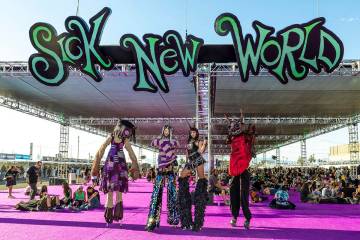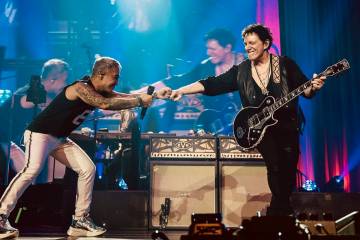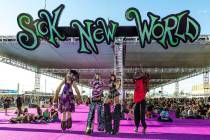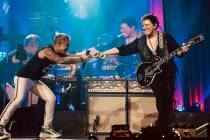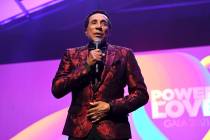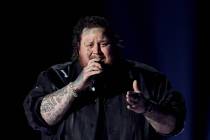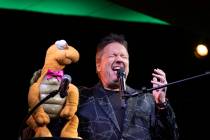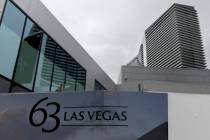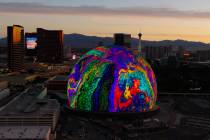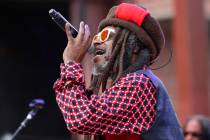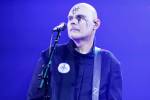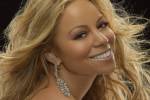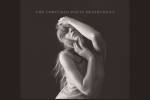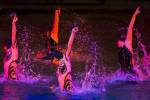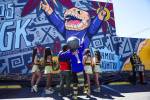It’s easy to see how Adam Lambert became a true American Idol
“Adam Lambert, 32, Superstar, Hollywood, CA.”
When Adam Lambert appeared last year as a guest judge on “American Idol,” returning to the show that catapulted him to fame, that was the biographical information that appeared on the screen.
Expressing regret that he wasn’t on hand for his original tryout, Harry Connick Jr. convinced Lambert to re-create his audition. The onscreen overlay didn’t appear dramatically different from how it read six years prior, when Lambert showed up in San Francisco and slayed everybody.
The age on the title card has changed, obviously, as Lambert was only 26 back then. But otherwise everything seems pretty much the same: same guy, same name, same hometown. If you pull up the clip on YouTube, however, you will notice one key difference: The word “superstar” has replaced the previous “stage actor” designation.
Considering how deftly Lambert leaped from a respectable theater career to being a bona fide star in what seemed like the blink of an eye, that couldn’t be more fitting or accurate, as that’s pretty much exactly what happened in real life.
Fact is, though, you didn’t have to be Simon Cowell to see that one coming. Back in 2009, from the very first notes when Lambert launched into an a capella version of “Bohemian Rhapsody,” it was apparent he was someone special, a performer poised to become the biggest pop star the program had produced since Kelly Clarkson and Carrie Underwood.
Just like when those two titanic talents set themselves apart with their stunning vocals, Lambert gave notice that he would set the world on fire, and that’s what he did in short order.
Looking back now, Lambert says that’s precisely what he aimed to do when he left the Los Angeles production of the musical “Wicked,” a role that paid quite well. One of the prerequisites for earning a place on “Idol” is that you can’t be attached to any such production.
“I auditioned for ‘Idol,’ and they were like, ‘You’ve got to quit that show,’ because you can’t be in a professional anything,” Lambert explains. “So I quit, and then ‘Idol’ happened. It was a gamble, because they made me quit before I even got in front of Simon, Paula and Randy and Kara. So it was definitely a gamble.”
Indeed. Before that opportunity arose, Lambert had worked tirelessly most of his adult life performing on stage.
To keep him occupied as a youngster, Lambert’s parents placed him in a theater group.
“That’s what started my love affair of performing, and we were doing musicals,” Lambert says. “I was listening to soundtracks of musicals and really diving into that whole world and studying. I was such a student of it. You know, I learned every soundtrack recording and score and then started taking voice lessons and really improved my voice.”
When it came time to choose one love over another, the decision wasn’t as agonizing as you’d think. He’d already determined that being a theatrical performer wasn’t completely scratching his itch.
“It wasn’t satisfying me creatively,” Lambert says. “It wasn’t matching what my actual interests were as a creative person. I realized that I had been listening to … up until that point, I had been listening to a lot of ’70s rock, and I had started a band, and then I went and did this and went, ‘I want to be in my band.’ ”
When “Idol” opened up, “I thought, well, this could be a shot and if I don’t take it, I’m going to kick myself later,” he says. “And I’m glad it worked out. It’s definitely an example of you’ve got to take the risk in order to get the reward.”
From the sound of it, he learned that lesson long before he was standing in that show’s glaring spotlight.
“What I realized was, if I wanted to be a singer and make that happen, I had to make it happen,” Lambert said in his 2011 “Behind the Music” episode, explaining an epiphany he had after attending Burning Man one year. “It wasn’t just going to happen to me, and I think that was the first time that I started realizing that I had control over my world.”
Lambert had started down the path to that realization years earlier while touring Europe as a cast member in “Hair.” Scenes in the show required nudity, and he was hesitant at first to expose himself to audiences. When he eventually did, it cultivated a newfound confidence that allowed Lambert to explore his sexuality and adventurous inclinations that he had repressed while growing up. Just like when he comfortably came out to his family a few years earlier, it filled him with a sense of freedom to be himself.
In Germany, where he and his cast members spent most of their time on that tour, Lambert found the cultural climate to be “progressive and liberal,” which encouraged him to express himself freely in his fashion and style, he says. That period proved to be very influential, as did his time a few years later performing with a cutting-edge theater group back home called the Zodiac Show; that’s when he really learned to start being more uninhibited.
In the pivotal years that preceded “Idol,” the Lambert that legions of fans love today really started to take shape. By then, he says, his powerful presence as a performer was being fed as much by his love of pop as it was by his growing fondness for the glamorous side of rock.
“You know, I just became really enthralled with the whole glam rock thing,” he recalls. “What I loved about it was it was music that was rock, but it was also pop, obviously, at the time, and it was also … the fashion of it was something that was really … especially at that time, it was, like, 22, 23, I had just come back from doing a show in Europe, where I was in Germany for six months. And everybody in Germany is very progressive and liberal. I was dressing like a crazy club kid.
“And I got home, and I was like, well, how do I combine all these things that I love. And that’s one of the reasons why that glam rock movement of the ’70s spoke to me. I was like, ‘Ah, God, I wish we had that now. That’s so in line with everything that I love and am and see myself as.’ And it just, I don’t know, it spoke to me. So Queen, Bowie, Slade, Velvet Underground, T-Rex, I mean you name it, I was very infatuated with that. And then bigger artists that came out of that, you know people like Prince and Michael Jackson and George Michael, you know, artists that were still very fashionable and fabulous but were putting out a different kind of music.”
Not surprisingly, all of those elements can be heard in the distinctive sound and style Lambert has cultivated, and that’s what sets him apart from all of the other singers that have come before him on “American Idol.” It’s also why he has had the staying power that so many of his peers from the program just didn’t have.
Looking back, it’s hard to believe that Lambert — who later ended up being enlisted to stand in for Freddie Mercury in Queen — was the runner-up on “Idol,” bested by another singer, Kris Allen, who had a good voice but wasn’t all that memorable otherwise. The most admirable part of Lambert’s “Idol” legacy is how he followed his own muse at a time when everybody else seemed to be moving the other direction — not unlike some of the artists who inspired him; one in particular comes to mind.
“I definitely think that he was ahead of his time,” Lambert says of David Bowie. “That’s why it was interesting to see so many artists respond to his death, so many young, contemporary artists beyond that generation. I just think that he wasn’t always doing what was popular, and that takes a lot of guts and a lot of bravery.
“To me, that’s what he kind of represents, a brave artist that was willing to go against the grain. And I think that inspired a lot of artists to come, but also inspired a lot of regular people, people that might have felt like outsiders. I think he was sort of the icon of the outsider for very many people.”
Sounds like the kind of stuff from which superstars are made.
Visit reviewjournal.com/music for more from our chat with Adam Lambert, including his experience filming a video in Las Vegas and his upcoming role in Fox’s remake of “Rocky Horror Picture Show.”
Contact Dave Herrera at dherrera@reviewjournal.com and follow @rjmusicdh on Twitter.
Preview
Who: Adam Lambert
When: 7:30 p.m. Friday
Where: The Foundry at SLS Vegas, 2535 Las Vegas Blvd. South
Tickets: $35 (702-761-7617)








